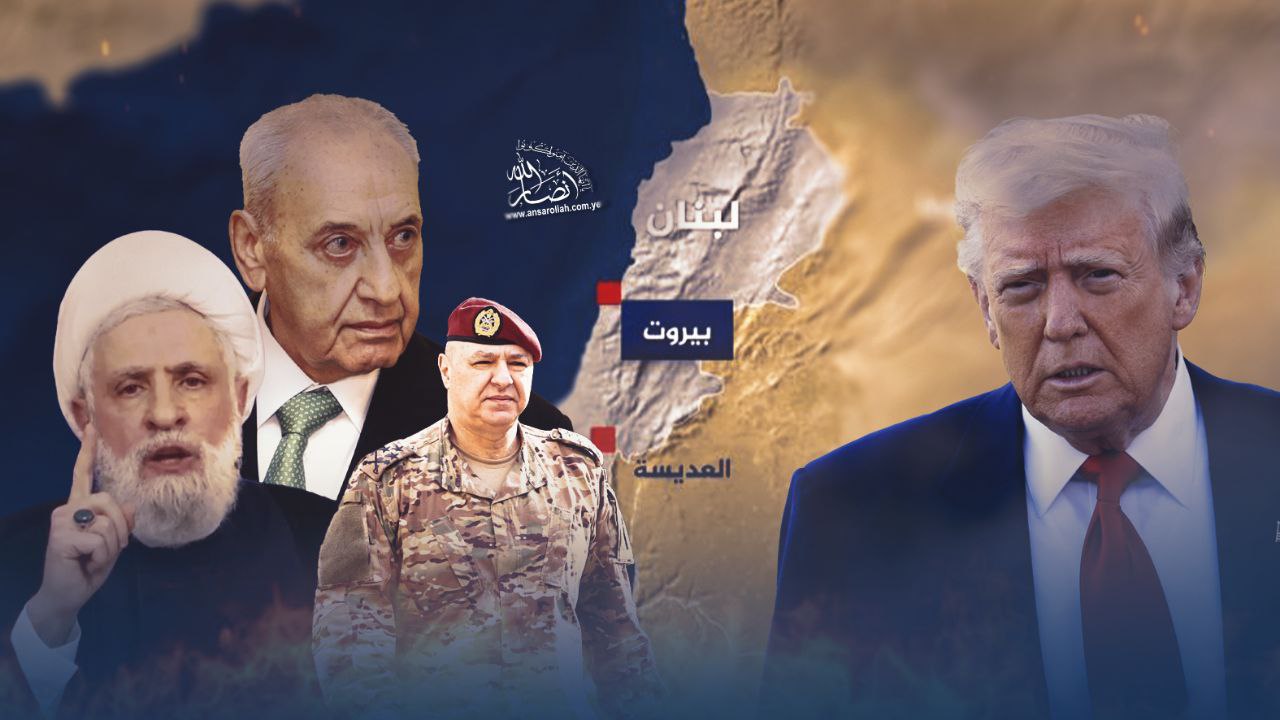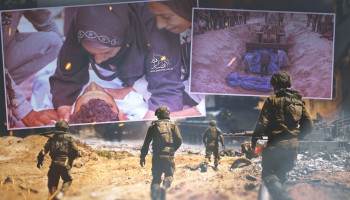Once again, the United States positions itself as the guardian of the region’s states, unabashedly presenting itself as the protector and sponsor of the occupying Zionist entity — a posture that ensures its ability to influence the present and future of the peoples of the Arabian region.
Today, acting on behalf of the occupying entity, Washington is forcefully intervening in Lebanon’s internal affairs in an attempt to pressure for the disarmament of the Islamic Resistance, Hezbollah. This, in addition to constituting a scheme to modernize the mechanisms of hegemony and empower the enemy to tighten its grip over the region, is a tacit acknowledgment of the disruption resistance causes to U.S. imperial projects. The insistence on this step comes within the broader context of eliminating resistance movements in the region and guaranteeing the Zionist entity’s security.
The superficial manner in which the U.S. approaches the issue of Hezbollah’s weapons reflects both a disregard for the region’s states and a profound underestimation of their sovereignty, particularly given the “zero” price likely to be offered in exchange for disarmament. Washington, furthermore, has no intention of guaranteeing any obligations Israel might be required to fulfill, effectively narrowing Lebanon’s options to the point of nonexistence. The result is a blatant dictate to relinquish sovereignty and political will, enabling the Israeli entity to freely convert regional states into mere client entities, ruled by local authorities that govern on behalf of, and in service to, the “Israeli” agenda.
The American plan — dubbed the “Barak Paper” — offers only an unguaranteed promise of Israel’s withdrawal from occupied Lebanese territories, with no confirmation that such a step would occur before or even simultaneously with disarmament. The plan also mentions a cessation of Israeli attacks and speculates — without assurance — that disarmament could open the door to international financial support for rebuilding areas devastated by the Zionist entity’s most recent war on Lebanon.
Lebanon’s confrontations with the Zionist entity since 2000 have repeatedly proven that the resistance’s arms remain a safeguard for the country and all its communities. Disarming under current, unfavorable conditions would serve only to secure the enemy’s northern front, giving it free rein to expand without deterrence — precisely the aim of the U.S. push. Ja‘fari Mufti Ahmad Qabalan warned that removing Hezbollah’s weapons would leave Lebanon defenseless. Hezbollah’s Al-Manar TV quoted “informed sources” as saying that the American demand amounts to “complete Lebanese surrender to the Israeli enemy without any binding guarantees for its compliance.”
Accordingly, Hezbollah’s stance remains firm: no new agreement can be discussed when the enemy has yet to honor previous commitments. Undermining Lebanon’s future and negatively impacting the entire region by following Washington’s designs is, the group insists, non-negotiable. Deputy Secretary-General Sheikh Naim Qassem declared, “No one can deprive Lebanon of its strength to protect its sovereignty, its policy, and its capabilities; no one can prevent Lebanon from being dignified.”
Hezbollah’s rejection of disarmament stems from the fact that the very reason for the resistance’s existence — the Zionist enemy — remains an ongoing threat. Lebanon’s strength lies in its resistance, and surrendering its arms cannot be seen as a path to stability or prosperity.
Acting on this conviction and refusing to yield to any foreign threats or pressures, Hezbollah considers its posture essential in compelling the enemy to keep its hands off Lebanon, while serving as a key force in the wider resistance axis that refuses the Israeli occupation and oppression of Palestine and its people.
On June 30, 2025 — the eve of the U.S. deadline for the Lebanese government to adopt a mechanism for surrendering or dismantling Hezbollah’s weapons — Sheikh Naim Qassem reaffirmed the right of Hezbollah and all Lebanese to say “No” to America and “No” to Israel. He accused Washington and Tel Aviv of seeking to exploit the current situation to impose a new reality in Lebanon and the region that serves their interests.
Sheikh Qassem’s remarks underscored Hezbollah leadership’s understanding of U.S. and Israeli ambitions. In a July 6 statement, the party responded by challenging the Israeli entity to first fully comply with the existing ceasefire — withdraw from occupied territories, halt all forms of aggression, and release prisoners — before any discussion on a “national defense strategy,” including the matter of Hezbollah’s arms, could begin. He also reiterated that Hezbollah would not surrender its weapons “in response to Israeli threats.” Washington, however, avoided making any commitments, while the Zionist enemy openly opposed any precondition tying its compliance to Hezbollah’s actions.
At a memorial ceremony marking forty days since the assassination of Major General Mohammad Saeed Izadi (Hajj Ramadan), commander of the Palestine portfolio, Hezbollah’s Secretary-General stressed that “any timetable presented under the umbrella of Israeli aggression is unacceptable.” He urged the Lebanese state to “develop plans to confront pressure and threats and provide protection,” rather than “strip its resistance of its power and capabilities.”
While the Lebanese presidency has demanded the Zionist entity’s withdrawal first, the visits and proposals of U.S. envoy “Barak” have clearly aligned Washington with the Israeli vision, applying increased pressure on Beirut. Barak bluntly told Lebanese officials that the U.S. would cease sending envoys or pressing Israel to halt its attacks unless the Lebanese government swiftly and publicly committed to disarmament.
A July 29 Reuters report revealed that Washington conditioned the resumption of any negotiations or further U.S. efforts on the Lebanese cabinet issuing an official resolution pledging to dismantle Hezbollah’s arsenal. This indicates that the United States has positioned itself as a representative of the Israeli side rather than a mediator.
The arrogance of enforcing the Israeli entity’s will was evident in Barak’s frank — and, as some saw it, brazen — statement to the Lebanese Prime Minister: Washington “cannot force Israel to do anything unless Beirut commits.” The stance confronting Beirut is thus, first and foremost, an American one.
Several analyses conclude that “what the United States is engaging in today is not mere political interference, but a clear act of aggression that goes beyond diplomatic norms and targets the very core of Lebanon’s sovereign decision-making.”







